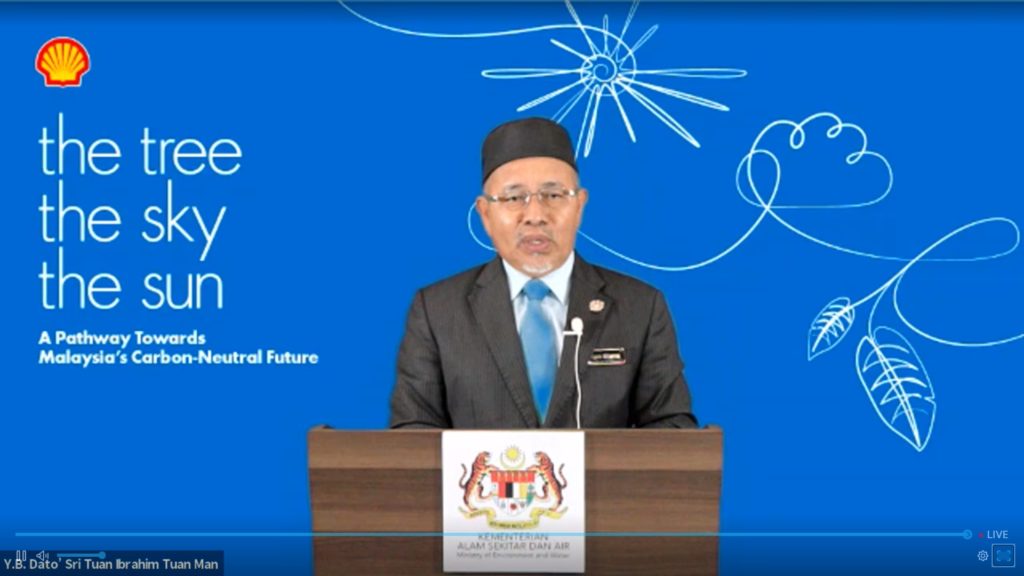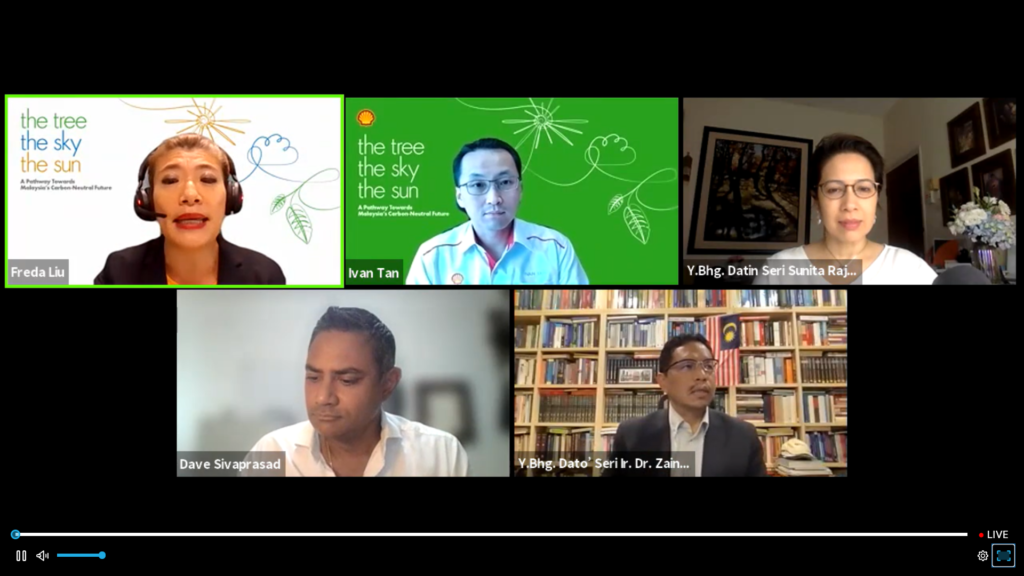
KUALA LUMPUR, July 6 – Shell Malaysia today launched “The Tree, The Sky, The Sun: A Pathway towards Malaysia’s Carbon Neutral Future“, a plan which spells out five possible ways, including increasing the acreage and density of forest, that could help moderate carbon emissions in Malaysia and set it on a path to achieving the possibility of carbon-neutrality by the year 2065.
In conjunction with the launch, Shell Malaysia and the Netherlands Embassy in Malaysia today hosted a virtual forum, which was graced by Dato’ Sri Tuan Ibrahim Tuan Man, Minister of Environment and Water, and Aart Jacobi, Ambassador of The Netherlands to Malaysia.
The Shell’s The Tree, The Sky, The Sun illustrates a technically possible yet challenging pathway for Malaysia, with its unique advantages of trees and sun, to meet the goal of the Paris Agreement to keep the rise in global average temperature to well below 2°C above pre-industrial levels1, with a stretch goal of 1.5°C.
Developed by Shell in consultation with key local stakeholders, the Shell’s pathway says the five most significant ways to moderate carbon emissions in Malaysia will be to 1) the increase in forest acreage and density; 2) the introduction and gradual increase in the carbon price; 3) the emphasis on energy efficiency; 4) the greater push for electrification; and 5) a more widespread use of renewables, especially solar energy.
In conjunction with the launch, a roundtable discussion was also held in collaboration with the Malaysian Dutch Business Council (MDBC), CEO Action Network, and Climate Governance Malaysia, the Ministry of Environment and Water and Boston Consulting Group.

Participants at the virtual event included stakeholders from the government, private sector, media, academia, non-governmental organisations, and energy consumers.
“It is exciting to see Malaysia having open and more transparent discussions on the true scale of the climate challenge and the actions needed for achieving carbon-neutrality. By publishing The Tree, The Sky, The Sun, Shell hopes to contribute to the national conversation about Malaysia’s energy transition and to the framing of the nation’s priorities in the run-up to COP26 and beyond. This is in line with the global ambition embodied in Shell’s Powering Progress strategy to become a net-zero emissions energy business by 2050,” said Ivan Tan, Chairman of Shell Malaysia.
In a press statement released following the event, Shell Malaysia quoted Marco Winter, Executive Director of MDBC saying: “The Tree, The Sky, The Sun combines policymaking with science-based targets to help us all see the benefits and opportunities of a sustainable future more clearly. The support of everyone – from energy producers to energy consumers – will be critical for achieving the milestones described by Shell’s aspirational pathway. We hope today’s gathering will spur more informed conversations about how we can all contribute towards building a carbon-neutral energy system for Malaysia and the world”.
Shell’s aspirational pathway reveals that the Malaysian energy system of 2065 will look significantly different from today. The economy-wide transformation required to achieve a carbon-neutral state will be underpinned by carbon pricing, or the external cost of carbon, which is phased in starting from 2026, coinciding with the start of the 13th Malaysia Plan (2026 – 2030). This drives reallocation of capital and resources toward low-carbon and energy efficient choices.
By 2065, renewable sources of energy will dominate a deeply electrified energy system. Solar has become the country’s single largest source of energy, coal has been phased out, while the remaining natural gas in the energy mix acts primarily as a means of supporting the use of renewable energy sources. Biofuel has displaced oil as the preferred liquid fuel for transportation and is used increasingly to meet the demand of difficult-to-electrify sectors such as aviation and shipping.
Gains in energy efficiency lead to a marginal increase in the country’s final energy demand, despite healthy economic growth during this period. Any remaining emissions from the energy system are removed by nature or technology – reforestation of an additional 5.8% of Malaysia’s land mass can capture up to 29 million tonnes of CO2 per year, effectively bringing forward Malaysia’s carbon-neutral date by 15 years to 2065.
Ultimately, the point at which Malaysia achieves carbon-neutrality depends on how aggressively these levers discussed are pursued in steering the economy towards a more sustainable post-pandemic recovery. Other pathways are possible and depend on societal and policy preferences, but a major shift in how society produces and consumes energy is required to limit the rise in global temperature and address the risks of climate change.
Crucially, it will take robust policy frameworks and more open public engagement to create societal support for action and enable the development of lower-carbon solutions and green technologies. Strong collaboration across government, business, and society will be crucial to make progress at the pace required for Malaysia’s energy system to be carbon-neutral by 2065.
To explore “The Tree, The Sky, The Sun: A Pathway towards Malaysia’s Carbon Neutral Future” in more detail, download the full story at www.shell.com.my/treeskysun.
–WE